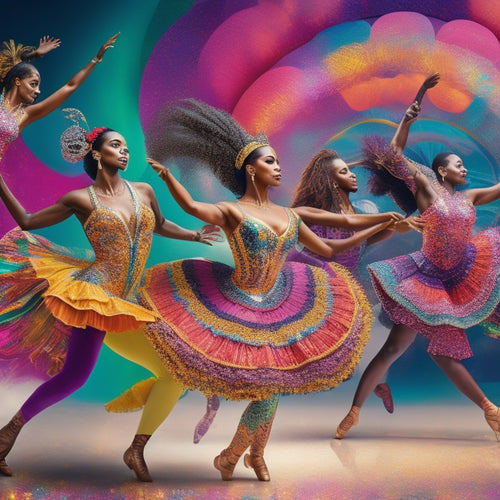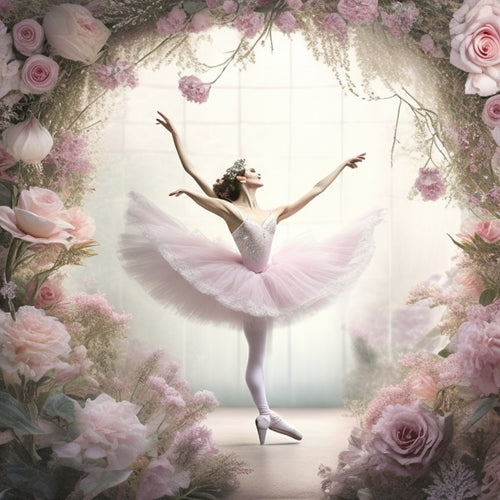
DEEA Mini Course: Building Equitable Dance Spaces
Share
Building equitable dance spaces requires a multifaceted approach that encompasses diversity celebration, community engagement, and equity promotion. It involves creating safe spaces that foster trust, open communication, and empathy, while amplifying underrepresented voices. To achieve this, dance educators must take action by implementing equity initiatives, providing diversity training, and establishing accountability mechanisms to dismantle systemic barriers and biases. By doing so, they can promote a culture of respect, empowerment, and inclusivity. As we explore the essential elements of inclusive dance spaces, we'll uncover the transformative power of intentional effort and commitment to creating a culture of mutual respect and empathy.
Key Takeaways
• The DEEA Mini Course focuses on implementing equity initiatives to promote diversity and inclusion in dance spaces.
• The course provides diversity training to educate participants on the importance of equity and inclusivity.
• It establishes accountability mechanisms to ensure a safe and respectful environment for all dancers.
• The course helps dismantle systemic barriers that hinder equal opportunities for underrepresented groups in dance.
• The DEEA Mini Course tracks progress and addresses concerns to ensure continuous improvement in building equitable dance spaces.
Building Inclusive Dance Spaces
What are the essential elements that dance educators and administrators must consider when building inclusive dance spaces that foster a sense of belonging and empowerment for all participants?
To create an environment where everyone feels valued, diversity celebration and community engagement are essential. This can be achieved by promoting equity and inclusivity in all aspects of the dance space.
Educators and administrators must endeavor to create an environment that celebrates diversity, promotes equity, and fosters a sense of community. By doing so, dance spaces can become a haven where participants feel empowered, valued, and respected.
Creating Safe Spaces for All
One essential aspect of building equitable dance spaces is creating safe spaces for all. This demands intentional efforts to establish trust, encourage open communication, and foster a culture of empathy and respect.
This involves promoting diversity inclusion and community engagement to guarantee that everyone feels valued and heard.
By establishing a safe environment, we can promote equity and create opportunities for underrepresented voices to be amplified. This, in turn, fosters a culture of empathy and respect, where everyone feels comfortable and empowered to express themselves.
Taking Action for Equity Now
By recognizing the importance of creating safe spaces, we can now focus on taking concrete steps to establish equitable dance environments, where every individual feels valued, respected, and empowered to thrive.
Taking action for equity now requires a deliberate and sustained effort to dismantle systemic barriers and biases. To achieve this, we can:
-
Implement equity initiatives: Develop and implement policies that promote diversity, equity, and inclusion in dance spaces.
-
Provide diversity training: Offer regular training sessions for dance instructors, staff, and volunteers to address implicit biases and microaggressions.
-
Establish accountability mechanisms: Create a system to track progress, address concerns, and hold individuals accountable for promoting equity and inclusion.
Frequently Asked Questions
Is the DEEA Mini Course Available for Registration After June 30, 2021?
As the summer sun sets, a pressing query arises: will registration remain open beyond June 30, 2021? Fortunately, the Summer Deadline marks not an end, but a new beginning, with Extended Access ensuring continued opportunities for inclusive growth.
Can I Register for the Course if I'm Not a Professional Dancer?
Regardless of professional dance experience, anyone can register for the course, fostering dance inclusivity. Beginner benefits include developing actionable steps to create safe, equitable, and inclusive dance spaces, promoting a culture of respect and safety for all participants.
Will I Receive a Certificate Upon Completing the DEEA Mini Course?
Upon completing the DEEA Mini Course, participants will receive a certificate, acknowledging their commitment to building equitable dance spaces, and benefiting from the course's accreditation, demonstrating expertise in fostering inclusive environments.
Are There Any Additional Course Materials or Fees Beyond the Registration Cost?
'No, there are no hidden costs or additional fees beyond the registration cost. Our clear pricing guarantees that participants can budget accordingly, with no surprise resource fees or supplemental reading costs, prioritizing safety and inclusivity.'
Can I Request a Refund if I'm Not Satisfied With the Course Content?
In terms of satisfaction guarantees, our refund policy guarantees that if you're not satisfied with the course content, a refund can be requested, providing a risk-free opportunity to engage with our equitable dance spaces development course.
Related Posts
-

Get Started With Dance Makeup: a Beginner's Guide
You're about to start on a creative journey that combines your passion for dance with the art of makeup. To get start...
-

Master Dance at All Skill Levels Now
Mastering dance at any skill level is achievable, whether you're a beginner or an experienced dancer. Learn at your o...
-

Captivating Ballerina SVG Designs for DIY Enthusiasts
Ballerina SVG designs have captured the interest of DIY enthusiasts and crafters, providing a versatile and sophistic...


